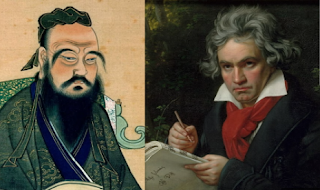Music is a universal language that has evolved differently across cultures, shaped by history, religion, philosophy, and technology. The journey of musical development from East to West reveals fascinating contrasts and occasional convergences. This article explores the evolution of music in Eastern and Western cultures, highlighting key innovations, cultural exchanges, and the modern globalized musical landscape.
I. Ancient Foundations: Eastern Musical Traditions
1. Early Beginnings in Mesopotamia and China
Music’s origins trace back to ancient civilizations, where it played a role in rituals, storytelling, and social cohesion.
China (2000 BCE – 500 CE):
The Guqin (a seven-string zither) became a symbol of scholarly refinement.
Confucianism emphasized music’s role in moral education, while Daoism saw it as a path to harmony with nature.
The Pentatonic scale (five-note scale) dominated traditional Chinese music.
India (1500 BCE – 500 CE):
The Vedas (sacred texts) included chants and hymns, forming the basis of Indian classical music.
The raga system (melodic frameworks) and tala (rhythmic cycles) became central to Indian music.
2. The Silk Road and Cultural Exchange
Trade routes facilitated musical exchanges between Persia, India, and China, leading to the spread of instruments like the lute (oud) and percussion.
II. Medieval and Renaissance: The Rise of Western Musical Structures
1. Gregorian Chant and Sacred Music (500–1400 CE)
Western music was heavily influenced by the Christian Church, with monophonic Gregorian chants dominating medieval Europe.
Polyphony (multiple independent melodies) emerged in the 12th century, marking a shift toward complexity.
2. The Renaissance (1400–1600): Harmony and Notation
The printing press (invented 1440) allowed wider dissemination of musical scores.
Major and minor scales began to take shape, contrasting with Eastern modal systems.
III. Classical and Romantic Eras: Western Art Music Flourishes
1. Baroque to Classical (1600–1800)
Bach, Mozart, and Beethoven refined Western harmony, counterpoint, and orchestration.
The symphony, sonata, and concerto became dominant forms.
2. Romanticism (1800–1900): Emotion and Nationalism
Composers like Chopin, Tchaikovsky, and Wagner emphasized emotional expression.
Folk influences entered classical music (e.g., Russian, Hungarian, and Spanish styles).
Meanwhile, Eastern traditions remained largely improvisational and modal, preserving ancient techniques.
IV. 20th Century: Cross-Cultural Influences and Modernization
1. Jazz, Blues, and the Birth of Global Popular Music
African rhythms merged with Western harmony, giving rise to jazz, blues, and rock.
Indian music influenced Western artists (The Beatles’ use of sitar in "Norwegian Wood").
2. Electronic Music and Globalization
Synthesizers and digital production revolutionized music in the West.
Bollywood, K-pop, and J-pop emerged as powerful Eastern musical exports.
V. The 21st Century: A Blended Musical World
Today, music is more interconnected than ever:
Western pop incorporates Middle Eastern scales (e.g., A.R. Rahman’s compositions).
Hip-hop and EDM fuse with traditional Asian instruments.
Streaming platforms allow instant global access to diverse musical styles.
The Future of Music Evolution
The evolution of music from East to West shows a dynamic interplay between tradition and innovation. As technology advances, cultural boundaries blur, leading to a rich, hybridized global sound. Whether through AI-generated music or revived folk traditions, the journey of musical evolution continues—bridging past and future, East and West.







